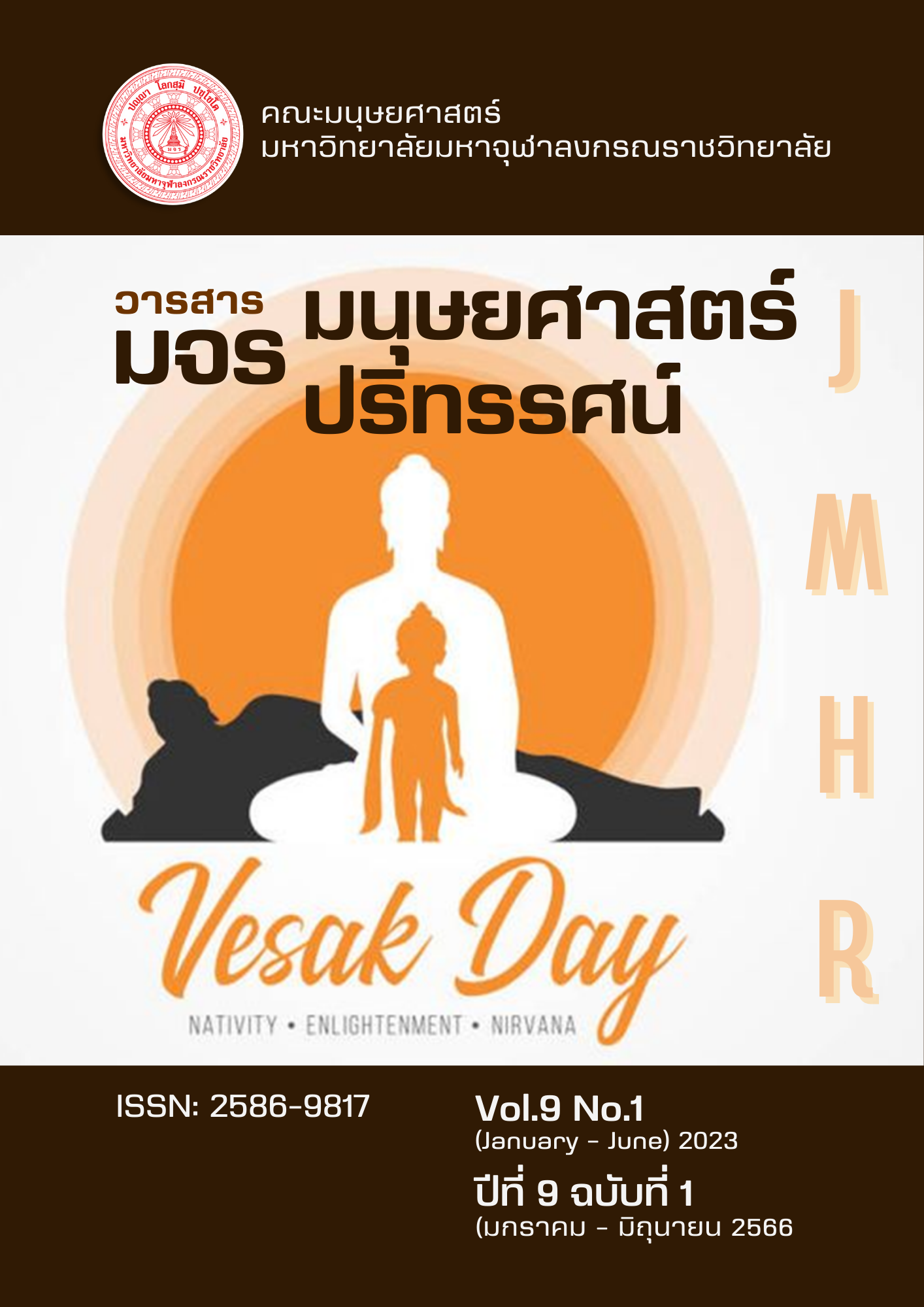ประสบการณ์การฟื้นคืนได้ของญาติผู้ดูแลที่ฝึกเจริญสติปัฏฐาน 4 และดูแลผู้สูงอายุที่มีภาวะพึ่งพิง
คำสำคัญ:
การฟื้นคืนได้, การเจริญสติ, ญาติผู้ดูแล, ผู้สูงอายุ, ภาวะพึ่งพิงบทคัดย่อ
การวิจัยครั้งนี้ ใช้วิธีการวิจัยเชิงคุณภาพแนวปรากฏการณ์วิทยาแบบตีความ เพื่อทำความเข้าใจประสบการณ์การฟื้นคืนได้ของญาติผู้ดูแลที่ฝึกเจริญสติปัฏฐาน 4 และดูแลผู้สูงอายุที่มีภาวะพึ่งพิง ผู้ให้ข้อมูลหลักเป็นญาติผู้ดูแลหลักของผู้สูงอายุที่มีภาวะพึ่งพิงที่มีคุณสมบัติตามเกณฑ์การคัดเลือกจำนวน 5 คน เก็บข้อมูลด้วยการสัมภาษณ์เชิงลึกแบบมีคำถามกึ่งโครงสร้าง ผลการศึกษาพบประสบการณ์การฟื้นคืนได้ของญาติผู้ดูแลที่ฝึกเจริญสติปัฏฐานสี่ 3 ประเด็นหลัก กล่าวคือ ประเด็นที่ 1 ความเครียด เหนื่อยล้า ชีวิตเสียสมดุล มี 4 ประเด็นย่อยได้แก่ 1.1) เครียด หงุดหงิดง่ายจากการดูแล 1.2) เหนื่อยล้า เกิดปัญหาสุขภาพ 1.3) อึดอัด ขาดสังคม ไม่ได้ทำสิ่งที่เคยทำ 1.4) คนรอบข้างไม่เข้าใจ ไม่สนับสนุนช่วยเหลือ ประเด็นที่ 2 สติทำให้รู้เท่าทันอารมณ์ สุขสงบ อ่อนโยนมีเมตตา มี 3 ประเด็นย่อยได้แก่ 2.1) สติทำให้รู้เท่าทัน ควบคุมอารมณ์ได้ 2.2) สมาธิรักษาใจให้สุขสงบ ใจมีพลัง 2.3) จิตใจอ่อนโยน มีเมตตา ประเด็นหลักที่ 3 เกิดปัญญา เข้าใจสัจธรรมชีวิต ปล่อยวาง และเติบโตทางธรรม มี 3 ประเด็นย่อยได้แก่ 3.1) เกิดสัมปชัญญะ ระลึกรู้เท่าทันความเป็นจริง 3.2) มองเห็นความไม่เที่ยง เข้าใจชีวิต เติบโตทางธรรม 3.3) ปล่อยวาง จิตคลายจากความยึดมั่นถือมั่น
เอกสารอ้างอิง
พระพรหมคุณาภรณ์ (ป. อ. ปยุตฺโต). (2555). พุทธธรรม ฉบับปรับขยาย (พิมพ์ครั้งที่ 32). กรุงเทพฯ : มหาวิทยาลัยมหาจุฬาลงกรณราชวิทยาลัย.
สำนักงานสถิติแห่งชาติ. (2564). การสำรวจประชากรสูงอายุในประเทศไทย. สำนักงานสถิติแห่งชาติ กระทรวงดิจิตัลเพื่อเศรษฐกิจและสังคม. สืบค้น 8 พฤษภาคม 2566, จาก https://shorturl.asia/7830v
Adelman, R. D., Tmanova, L. L., Delgado, D., Dion, S., & Lachs, M. S. (2014). Caregiver burden: a clinical review. Jama, 311(10), 1052-1060.
Bishop, S. R., Lau, M., Shapiro, S., Carlson, L., Anderson, N. D., Carmody, J., ... & Devins, G. (2004). Mindfulness: a proposed operational definition. Clinical Psychology: Science and Practice, 11(3), 230.
Brown, K. W., & Ryan, R. M. (2004). Perils and promise in defining and measuring mindfulness: observations from experience. Clinical Psychology: Science and Practice, 11(3), 242-248.
Hwang, W. J., Lee, T. Y., Lim, K. O., Bae, D., Kwak, S., Park, H. Y., & Kwon, J. S. (2018). The effects of four days of intensive mindfulness meditation training (Templestay program) on resilience to stress: a randomized controlled trial. Psychology, health & medicine, 23(5), 497–504.
Moral-Fernández, L., Frías-Osuna, A., Moreno-Cámara, S. et al. The start of caring for an elderly dependent family member: a qualitative metasynthesis. BMC Geriatrics, 18, 228 (2018).
Richardson, G. E., Neiger, B. L., Jensen, S., & Kumpfer, K. L. (1990). The resiliency model. Health Education, 21, 33–39.
Richardson, G. E. (2002). The metatheory of resilience and resiliency. Journal of clinical psychology, 58(3), 307-321.
Whitebird, R. R., Kreitzer, M., Crain, A. L., Lewis, B. A., Hanson, L. R., & Enstad, C. J. (2013). Mindfulness-based stress reduction for family caregivers: a randomized controlled trial. The Gerontologist, 53(4), 676-686.
Wells, C. M., & Klocko, B. A. (2018). Principal well-being and resilience: Mindfulness as a means to that end. NASSP Bulletin, 102(2), 161-173.
ดาวน์โหลด
เผยแพร่แล้ว
รูปแบบการอ้างอิง
ฉบับ
ประเภทบทความ
หมวดหมู่
สัญญาอนุญาต
ลิขสิทธิ์ (c) 2023 วารสาร มจร มนุษยศาสตร์ปริทรรศน์

อนุญาตภายใต้เงื่อนไข Creative Commons Attribution-NonCommercial-NoDerivatives 4.0 International License.






